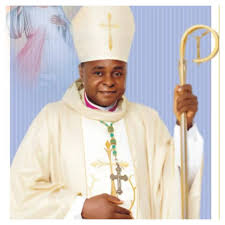On his 60th birthday, Reverend Anthony Adaji, the Catholic Bishop of Idah Diocese, expressed serious concerns regarding the direction of Nigeria under the leadership of President Bola Tinubu. Speaking at Our Lady Mother of Mercy Catholic Church in Idah, Adaji firmly criticized the current administration, contending that Nigeria is on a path toward becoming a failed state. He highlighted the erosion of trust between the Nigerian populace and the government, noting that the political landscape is dominated by a single party in many states, which undermines the principles of democracy. According to Adaji, the situation is dire, with the continued declaration of local government election results showing only one party victorious. His remarks paint a grim picture of the political environment and the challenges facing democratic governance in Nigeria.
The bishop’s critique extended beyond politics to encompass the alarming social conditions affecting everyday Nigerians. He lamented that people are dying from starvation, detailing how some citizens cannot afford even a basic meal, like a cup of garri. Adaji referenced a former American ambassador’s observation about Nigeria’s wealth of black intellect, questioning how such a richly endowed country could be sinking so rapidly towards failure. He suggested that this decline is exacerbated by the actions of corrupt politicians who have collectively undermined democratic processes, preventing true representation from emerging in local governance structures. In his view, the absence of genuine competition in elections reflects a systemic failure that poses a significant threat to the nation’s democratic ideals.
Delving deeper into the root causes of Nigeria’s challenges, Adaji attributed the current economic crisis to self-inflicted wounds. He underscored Nigeria’s vast resources, stating that in a land rich with wealth, there should be no child going hungry. However, the mismanagement of these resources has led to the current state of widespread poverty and hardship. By framing the economic difficulties as a result of neglect and corruption rather than an external crisis, Adaji called attention to the need for accountability and better stewardship of Nigeria’s abundant assets. He clearly expressed that, without meaningful reforms, the situation would likely deteriorate, further pushing the nation toward a deeper state of crisis.
Evaluating President Tinubu’s administration, Adaji characterized it as ineffective and detrimental to the wellbeing of ordinary Nigerians. He specifically criticized the removal of fuel subsidies and the spike in food prices, which have severely impacted the cost of living. Many families are struggling to meet their basic needs, and the bishop openly lamented this reality, asserting that a government unable to provide for its citizens cannot be viewed as progressive. He declared that such circumstances reflect a failure in governance and highlighted the stark contrast between the wealth allocated to politicians and the poverty faced by the populace. This disparity has incited widespread frustration among citizens, further eroding trust in the government.
In addition to his criticisms, Adaji emphasized the profound implications of the current political and economic climate for the future of Nigeria. He contended that unchecked governance and the continued looting of resources will lead the country toward potential doom. As he examined the deteriorating situation, he called for urgent action and a re-evaluation of priorities to prevent the nation from spiraling downward. His discourse serves not only as an indictment of the current administration but also as a wake-up call for Nigerians to demand better governance and to hold their leaders accountable for the promises made to them.
Finally, Adaji urged Nigerians to come together in prayer and unity, emphasizing the need for collective action in the face of adversity. He expressed hope for a more cohesive and determined citizenry that would pursue a better future for the country. Despite the grim assessment of the current state of Nigeria, the bishop’s call for prayer suggests a belief in the possibility of redemption and healing for the nation. His remarks reflect a profound concern for the welfare of citizens and serve as both a critique of the political elite and a plea for unity and resilience among the populace. Through his statements, it becomes evident that the challenges Nigeria faces are complex and multifaceted, requiring not just political change but a fundamental shift in the approach to governance and national identity.














